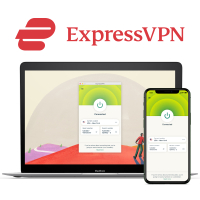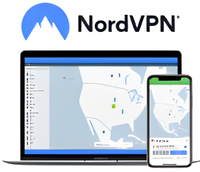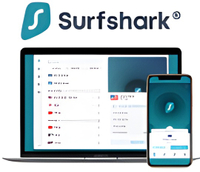Why every family should have a VPN
Protect your family's digital privacy with a high-quality VPN

A virtual private network (VPN), anonymizes you on the internet by masking your IP address (your device’s digital fingerprint) by routing your internet traffic through one of its many remote servers spread worldwide. By connecting to a server abroad and encrypting your data, a VPN allows you to change your virtual location and hide your internet activities and personal data from snoopers.
The benefits of getting a VPN for your family are multifold. Yes, you and your family members can use it to browse safely and stay protected on public Wi-Fi, but you can also use it to access geo-exclusive content, get better deals on online purchases, and your kids can play online video games without risking their safety.
At TechRadar, our experts have tons of experience testing VPNs, and we’ve filtered out the best VPN for families based on core aspects such as security, ease of use, price, usability, and simultaneous connections. In this article, we’ll also shed light on the benefits of a VPN for families, the best way to decide which VPN is right for your family, and how to set it up, so make sure you read until the end.
Why should you get a VPN?
In today’s day and age where digital security risks are at all-time highs, VPNs are a must-have. Plus, given that they’re more than just privacy watchdogs, the answer to the question “Do I need a VPN?” is a resounding yes. Keep reading as we'll get into the nitty-gritty of why you should use a VPN in 2025.
To keep your family safe online
Without a VPN, your internet traffic is routed through your internet service provider’s (ISP) server, meaning details such as the websites you’ve visited, your device information, your approximate location, and even your personal information can be accessed by your ISP, hackers, prying government authorities, and your hotspot operator—in case you’re using a public Wi-Fi.
A VPN keeps you safe from snoopers by sending your data through the VPN’s server (not the ISP’s). Secondly, it encrypts all your data (makes it unreadable to interceptors) using strong encryption protocols like WireGuard, OpenVPN, and IKEv2.
By changing your IP address and encrypting your information, a VPN “hides” you on the internet, meaning ill-intended third parties can’t track your online activities.
Additionally, the best VPNs offer several privacy and security features. These include a kill switch, leak protection, and a strict no-logs policy.
If your VPN connection drops, the kill switch will activate and automatically disconnect your device from the internet, stopping your data from leaking to the web. Next, a no-logs promise is a security policy wherein the VPN provider guarantees that it doesn’t store any sensitive user data, such as information that could reveal your identity and online activity.
So, a VPN is undoubtedly an essential part of your online security toolkit, but does it offer protection against malware and ransomware? Unfortunately, no. To keep your family members and their devices safe from more or less every cyber threat, opt for all-round security packages that come with a VPN, an antivirus, a password manager, and even parental controls. Popular options include NordVPN, Surfshark, Bitdefender, Norton, and Aura.
To stream content online
Netflix, HBO Max, Prime Video, and BBC iPlayer, among others, offer different content in different locations. Sometimes it’s the streaming service, while on other occasions, it’s your government that may geo-block certain movies, TV shows, and even apps—China and the UAE have banned the popular VoIP solution WhatsApp.
A reliable way around these blocks is to use a VPN, as it allows you to change your IP address to a country of your choice, so to the streaming service, it’d look like you’re physically present there—although you’re not, of course. For example, you may connect to a UK-based VPN server while you’re in the US and enjoy access to BBC iPlayer that’s unavailable outside the UK.
It’s worth noting that the extent of foreign content you’re able to unblock depends on the unblocking capabilities of your VPN. This is because some streaming services like Netflix are very good at detecting when there’s a VPN at play. If streaming is your family’s primary intended use case, check out our guides to the best Netflix VPN and the best streaming VPN.
We’ve mentioned that VPNs are a great way to watch your favorite movies and TV shows, but their location-spoofing and unblocking powers can benefit you in other ways too. You can change your location to get better discounts on flight tickets and game sales, as well as enjoy entry to easy bot lobbies in competitive multiplayer games like Call of Duty and League of Legends.
How to choose a VPN
Look for a VPN with excellent security credentials. Features like a kill switch, leak protection, a no-logs policy, and strong encryption are all must-have. If you want comprehensive protection, we recommend providers like NordVPN and Surfshark that come with valuable extras, like a password manager, malware protection, and ad-blocking.
One of the most important considerations when picking out a family VPN is the number of simultaneous connections. While most providers can cover anywhere between 6-10 devices at a single time, if you want to be able to share the VPN’s security with every single device in your family, you can opt for VPNs like Surfshark and Private Internet Access—both offer unlimited simultaneous connections.
A vast fleet of servers is just as important as any other factor. A VPN with thousands of servers worldwide will allow you to connect to the location of your choice, such as the country whose content you wish to watch.
Pick a VPN that’s compatible with various devices, such as Windows, Mac, iOS, Android, and more so that everyone in your family can use it regardless of their device type. Also, consider whether the VPN offers comprehensive setup guides and troubleshooting resources for various platforms as well as 24/7 support so that all of your queries are promptly sorted.
Last but not least, your budget is going to play an important role. If you can splurge on a premium provider, ExpressVPN is a no-brainer. However, if you’re pinching for pennies, you can go for a good cheap VPN.
How to set up a VPN
VPNs, like any tech service, may seem complicated at the outset, but once you understand the basics, getting started and using a VPN day-to-day is actually really simple.
First things first, go to your chosen VPN’s website (we’re using ExpressVPN as an example for this guide) and sign up for a subscription. Remember, the longer the length of the subscription, the more value for your money you’ll get.
Next, download and install the most relevant VPN app for your particular device type. So, if you have a mobile phone, you’ll either download the iPhone VPN or the Android VPN app; desktop users will get the Mac VPN client or the Windows VPN, and so on.
Note: we recommend using the official download links from the VPN’s website to avoid downloading potentially dangerous software masquerading as a VPN.
Then you simply launch the VPN app and log in with your username and password. It’s worth noting that some providers, like ExpressVPN, provide an activation code, which you have to enter when you’re prompted to do so.
Congratulations, your VPN is set up and ready to protect you from the dangers of the internet.
Now, besides common platforms like Windows, Mac, iOS, and Android, VPNs offer compatible apps for tons of other devices too, such as Linux, Chromebooks, Amazon Kindle, gaming consoles, Smart TVs, routers, and more.
While the setup process for these isn’t as straightforward as just installing the VPN app, comprehensive guides by ExpressVPN with screenshots and step-by-step explanations should give you all the help you need.
The best VPN for families in 2025
Not only did we test the VPNs across core aspects such as ease of use, design, performance, usability, and value, but we also looked at the providers' customer support, the number of simultaneous connections they offer, and whether there's an in-depth knowledge hub to aid the VPN app's setup and day-to-day use by every single family member of yours.
Here are the three best VPN services for families on the market right now:
1. ExpressVPN: the best VPN service in 2025
ExpressVPN is the #1 VPN overall, thanks to rock-solid privacy and security credentials, excellent speeds, powerful unblocking, and one of the largest networks of servers we’ve seen. Plus, with easy-to-use apps, friendly 24/7 support, and ample simultaneous connections, it’s an ideal buy for beginners and small families alike.
Its 30-day money-back guarantee lets you try out the service without risking a single penny, and TechRadar readers can claim 3 months of extra protection and 1 year of unlimited cloud storage for free.
2. NordVPN: the fastest VPN around
NordVPN is tailor-made for families that want all-round protection at a reasonable price—you get a seriously powerful VPN with class-leading speeds and extras like built-in antivirus and ad-blocking.
Streaming-wise, too, Nord is at the top of the ladder, unblocking everything you can throw at it, and there’s 24/7 support for help on the fly. You'll even get a 30-day money-back guarantee so that you can try it out risk-free before you commit.
3. Surfshark: the best cheap VPN
Surfshark is best suited for large families wanting to protect a lot of devices on a single plan, thanks to unlimited simultaneous connections. It’s also perfect for those on a tight budget who still want a fully-featured VPN with excellent security and blazing speeds.
It’s compatible with virtually every device type, offers easy-to-use apps for beginners, and unblocks any streaming service you point at it. Be sure to make the most of its 30-day money-back guarantee to see how it compares to ExpressVPN and NordVPN.
Using a VPN FAQs
Are VPNs safe?
The best VPN services are all extremely safe, as we've shortlisted them after thorough testing. However, it's important to note that not all VPNs are created equal, and there are many unreliable providers that track your IP and keep logs of your internet activities.
If you want to find out first-hand whether a VPN can be trusted, make sure it boasts a strict no-logs policy, supports the most popular and secure encryption protocols (WireGuard, OpenVPN, IKEv2), and offers indispensable features like a kill switch and leak protection.
Is it legal to use a VPN?
It depends on where you are and what you use the VPN for. In most countries around the world, it’s perfectly legal to use a VPN for legitimate purposes like protecting your privacy, while it's illegal if you use it for downloading copyrighted content.
However, countries like North Korea, Iraq, and Turkmenistan have completely banned all VPNs within their borders, China and Russia only allow government-approved providers, and Turkey, though not as strict, still blocks access to the sites or servers of VPN providers that don't follow its rules.
Are VPNs easy to use?
Yes, VPNs are generally simple to use. However, some of them are designed for experts, so they come packing deep customization options and lots of settings.
If you're a beginner and would like an easy-to-use VPN provider, we recommend ExpressVPN. It comes with an intuitive one-click connect functionality so that you connect once and you're always protected—and its proprietary Lightway protocol automatically selects the best server and encryption for your particular use case.
How we test VPNs
To keep our analyses objective, we follow our detailed VPN testing methodology to test the top VPNs on the market at regular intervals. We also conduct daily evaluations where we test the VPN(s) based on the use cases we’re writing about—ease of use, design, customer support, etc.
Our complete evaluation includes scouring the provider’s website where we take a closer look at its privacy policy, support options, and any claim it makes. We tell our readers if we think that the VPN’s claims are just marketing blurb and not something it can deliver in real-world scenarios.
Next, we dig deeper and download the VPN’s clients on all popular OS. We then test each of them and all the features therein, including the reliability of the kill switch and leak protection. While we’re at it, we also test any additional features that may be on offer, such as split tunneling, one-connect functionality, etc.
For speed-testing, we test every single provider’s speeds at least 120 times. This is across two sessions, using different encryption protocols, speed test websites, and features.
We also rank the VPN providers based on their unblocking capabilities. For this, we try to access geo-blocked content on four streaming sites—Netflix, Amazon Prime Video, Disney Plus, and BBC iPlayer—from three different locations around the world.
Disclaimer
We test and review VPN services in the context of legal recreational uses. For example:
1. Accessing a service from another country (subject to the terms and conditions of that service).
2. Protecting your online security and strengthening your online privacy when abroad.
We do not support or condone the illegal or malicious use of VPN services. Consuming pirated content that is paid-for is neither endorsed nor approved by Future Publishing.
Get daily insight, inspiration and deals in your inbox
Sign up for breaking news, reviews, opinion, top tech deals, and more.

Olivia joined Tom's Guide in October 2023 as part of the core Future Tech Software team, and is the Commissioning Editor at Tom's Guide. With a background in cybersecurity, Olivia is interested in how VPNs protect users' privacy, and how they improve online safety. She also regularly uses VPNs to make sure they deliver what they promise, and specializes in testing VPNs with streaming sites.


